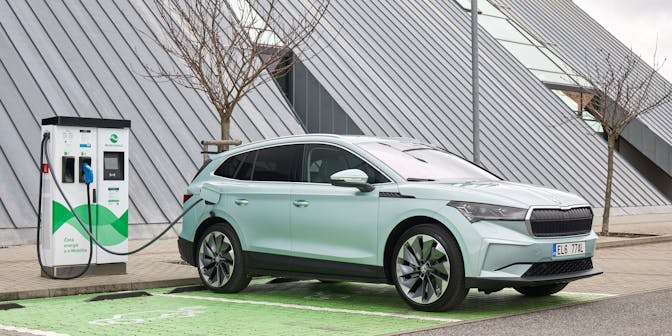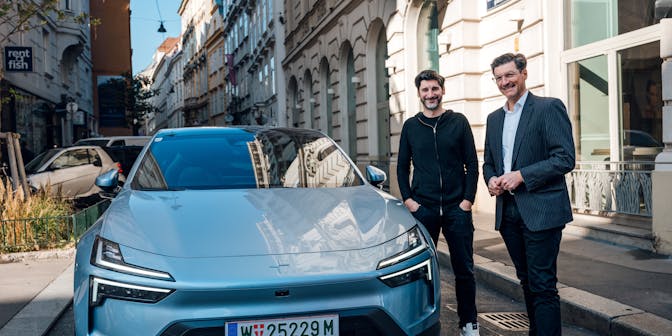How AI-powered charging is contributing to affordable and sustainable energy for UK EV fleet management
We’re officially in the era of the EV, and the UK is all in. That said, from a fleet management perspective, with the government’s ambitious target to phase out petrol and diesel cars by 2030 in the ZEV mandate, the need for efficient and sustainable charging solutions is more pressing than ever.
Key highlights:
-
DriveElectric's AI-powered charging systems optimise schedules, balance energy costs, and reduce grid strain, making them ideal for businesses with large EV fleets.
-
AI charging saves money by using off-peak electricity rates, avoiding peak demand charges, and integrating renewable energy sources, reducing overall energy expenses.
-
AI charging reduces carbon emissions by up to 40% by using more renewable energy, helping to fight climate change and promote sustainability.
-
The Electric Nation project showed that 81% of participants valued the cost and energy savings from off-peak charging, proving the benefits of AI-powered charging for both homes and businesses.
We’re officially in the era of the EV, and the UK is all in. That said, from a fleet management perspective, with the government’s ambitious target to phase out petrol and diesel cars by 2030 in the ZEV mandate, the need for efficient and sustainable charging solutions is more pressing than ever. AI-powered charging can play a pivotal role in not only making electric vehicle ownership more convenient but also in contributing to significant energy savings and lower carbon emissions. But, what about the other important factors, such as peak demand challenges and expensive energy bills for businesses? Can AI-powered charging help in those areas too? Let’s explore.
AI charging is the smart solution to peak demand
For businesses managing sizable EV fleets, AI charging / smart charging systems such as our DriveElectric plus app represent a transformative solution to peak demand challenges. These cutting-edge systems leverage advanced algorithms and machine learning to optimise charging schedules, balancing energy costs and grid strain.

By analysing data on energy prices, grid demand, and individual vehicle usage patterns, AI algorithms determine the most cost-effective times for charging, flattening demand curves and reducing spikes during peak hours. Cloud-based management facilitates centralised control and real-time monitoring, enabling businesses to streamline fleet charging operations and predict maintenance needs.
What’s more, the benefits of AI powered charging for businesses are huge: cost savings through off-peak charging and renewable energy integration, enhanced grid efficiency, reduced carbon emissions, and improved operational efficiency are just some of the positive outcomes.

Furthermore, at DriveElectric, we have first-hand experience of how AI-powered charging, grid management and energy sustainability can be extremely beneficial in a domestic setting too, as through our role of recruiters for trial participants in the Electric Nation project, it was concluded that 81% of the 700 participants believed that the energy and money-saving benefits of charging their EVs at home during off-peak times was worth the adjustment.
The financial benefits of AI-powered charging
AI-powered charging can look good for businesses bottom line, especially the ones managing EV fleets, as the financial benefits include:
-
Optimised charging schedules - AI algorithms determine the most cost-effective times to charge vehicles, capitalising on off-peak electricity rates and reducing energy expenses.
-
Load balancing - Charging loads are intelligently balanced to avoid peak demand times, minimising the risk of incurring additional charges and optimising grid usage.
-
Integration with renewable energy - AI charging systems integrate with renewable energy sources, enabling businesses to further reduce reliance on grid electricity and potentially generate revenue through energy arbitrage.
For the broader community, reduced peak demand means less pressure on the electricity grid. This can potentially delay or even negate the need for expensive infrastructure upgrades. These savings can be passed on to consumers in the form of lower energy prices, benefiting all electricity users, not just those with electric vehicles.

The environmental impact of AI-powered charging and its ability to lower carbon emissions
In addition to its financial benefits, AI-powered charging holds significant promise for reducing carbon emissions and promoting environmental sustainability. By optimising charging schedules based on factors such as renewable energy availability and grid demand, AI algorithms can significantly increase the use of clean energy sources for charging EVs. This results in a substantial reduction in carbon emissions associated with traditional fossil fuel-powered vehicles.
- Lower carbon emissions
-
by up to 40%
with smart charging
- optimised charging could save
-
800 pounds of CO2
per vehicle per year
Studies have shown that smart charging solutions can lower carbon emissions by up to 40%, making a significant contribution to mitigating climate change, and a further report from RMI found that optimised charging could save an average of 800 pounds of CO2 per vehicle per year, which is the equivalent of the energy consumption of an average home for around 40 days.
At DriveElectric, we are committed to promoting sustainable and efficient charging solutions. By harnessing the power of AI through our DriveElectric Plus app, we can make EVs – and in particular, EV fleets – more cost effective and sustainable.
Our Expert Guides
Why 2025 is a turning point for SME fleets

6 surprising things you didn’t know about electric vans
Understanding Vehicle Excise Duty (VED) or "Road Tax" for EVs

How is Salary Sacrifice calculated?
Last updated: Jul 2025
Published: Aug 2024